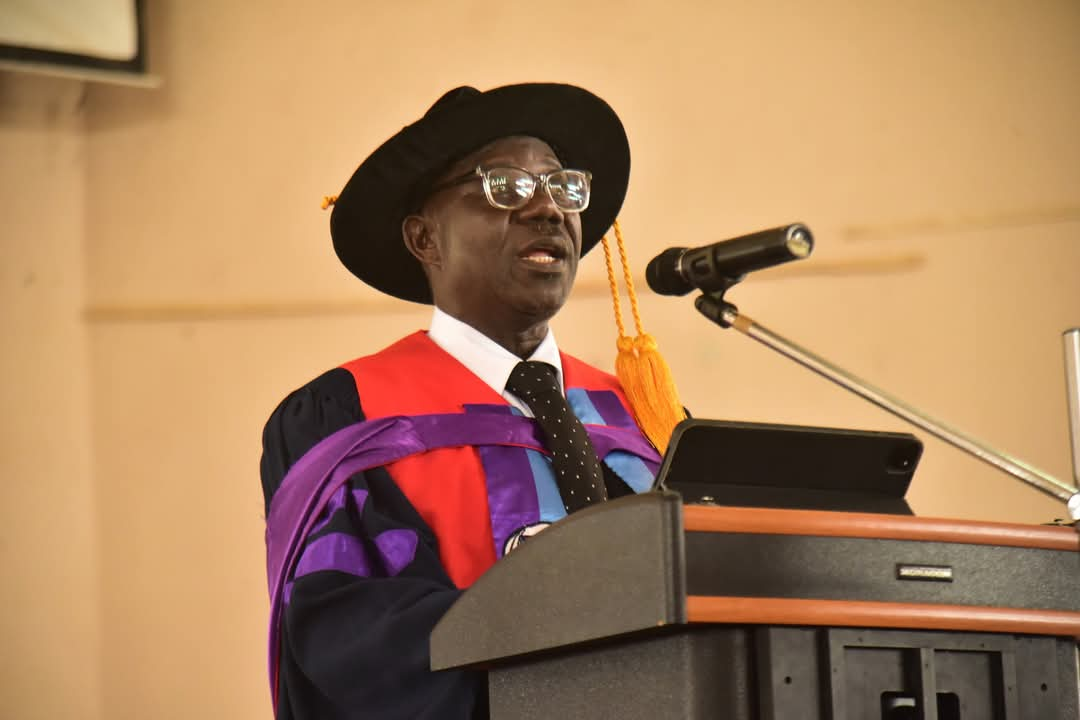“To address these issues, Nigeria must adopt sustainable practices in agriculture, energy, infrastructure supported by government policies and green technologies. This approach can reduce environmental degradation, foster a resilient economy and ensure a peaceful, sustainable future”
By John Odunayo
A don at Federal University of Technology Akure (FUTA), Prof. Emmanuel Ogolo, has canvassed adoption of climate smart disaster risk reduction initiatives in promoting sustainable development and protecting the environment from climate change impacts such as wildfires, floods and droughts.
The professor of Atmospheric Physics at the spoke in the spoke at FUTA while delivering the 179th inaugural lecture of the institution.

Ogolo said, “Rapid urbanization, resource exploitation and industrial growth have caused pollution, deforestation and habitat destruction threatening long-term stability and equity.
“To address these issues, Nigeria must adopt sustainable practices in agriculture, energy, infrastructure supported by government policies and green technologies. This approach can reduce environmental degradation, foster a resilient economy and ensure a peaceful, sustainable future.
“Human activities and climate change have degraded Nigeria’s biodiversity, leading to loss of ecosystem services, extreme climate events, and worsened food security, health and the economy.”

Professor Ogolo, who said the situation is dire, said, “Therefore urgent action is needed to prevent ecosystem degradation, species extinction and loss of functionality.
According to him, “Rising disaster frequency, due to climate change, urbanization and land use changes necessitates cross-sectoral engagement and integration of climate risks into development planning.”
Ogolo itemised the solution to include such interventions as climate action planning, resilience building, awareness campaigns, and international cooperation.
The lecturer described biodiversity as the variety of life forms, including animals, plants, fungi and microorganisms within a specific area which sustain balance and supports essential resources like food, water, medicine and shelter, adding that biodiversity is crucial for human survival, ecological balance and climate change mitigation.

Ogolo, however, pointed out that climate change accelerates biodiversity loss by altering habitats, species interactions, increasing extinction risks, positing that combating biodiversity loss requires reducing habitat destruction, pollution and climate change while promoting sustainable resource management.
He said, “Since the 1970s, increased greenhouse gas emissions from fossil fuel combustion and deforestation have driven climate change to more frequent natural disasters, rising sea levels, reduced crop productivity and biodiversity loss. Climate shapes plant species distribution, growth and community diversity, while plant-animal interactions are vital for ecosystem functioning and restoration.
“Ecosystems contribute to climate change mitigation and adaptation by reducing carbon emissions and buffering against extreme events like wildfires, floods and droughts.
Understanding ecological responses to climate change enables better anticipation and adaptation strategies for human communities”.
He recommended positive responses to biodiversity loss under future climate to include increased research investment, promotion of community engagement, combating complacency and ignorance, promoting green infrastructure, fostering international cooperation combining large scale restoration with localized conservative actions and embedding biodiversity conservation within SDG implementation for sustainable development.

In her capacity as chairman, the Vice Chancellor, Prof. Adenike Oladiji, said the topic of lecture is timely and apt given the negative impact of climate change on the earth and the need for urgent measures to make the earth more habitable for future generations to come.
She said, “Biodiversity covers the Earth in a vast, interconnected web of life, spanning every ecosystem—from dense rain forests to deep oceans, arid deserts to icy polar regions. The distribution and variety of life depend on factors like climate, geography, and human influence and converted efforts must be put in place to maintain this status quo and prevent it from further depreciation”.
The VC described Professor Ogolo as an erudite, cerebral and consistently productive scholar who had contributed immensely to his field of specialization.




